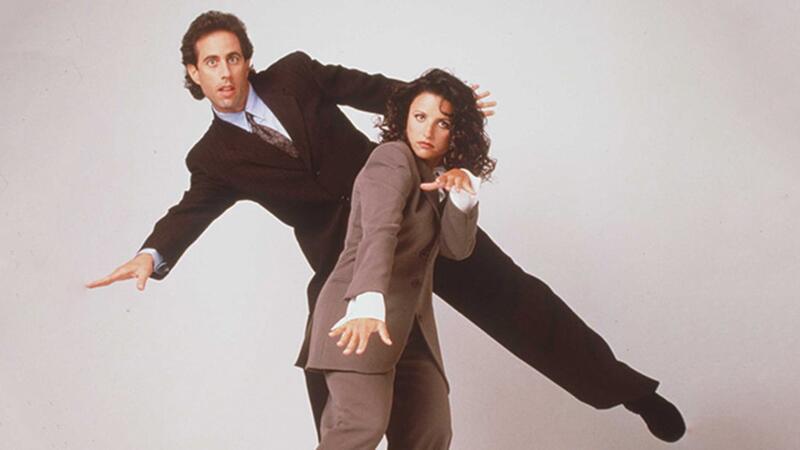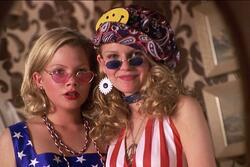The Catharsis of Jewish Comedy
What is Jewish comedy?
Is it its own genre, or a subgeneric descriptor? Is a Jewish comedian the same thing as a comedian who is Jewish? Is a movie or series Jewish just by nature of having a Jewish writer or actor attached to the project? Is making fun of Jewish culture always a punch down, even if a Jew is making the jokes?
Comedy is a delicate thing—no one has the exact same sense of humor. Seeking a singular definition or formula for any kind of comedy is a slippery slope, but I can’t help my curiosity. As an aspiring writer myself, I ask: What is the role, or perhaps even the responsibility, of the Jewish comic?
For decades, scholars have attempted to define the somewhat intangible concept of Jewish comedy. Saul Bellow wrote that it is the combination of “laughter and trembling.” MyJewishLearning defines it as comedy that “snickers in the face of authority” and boldly crosses boundaries, citing Sarah laughing in the face of God—while also acknowledging that endeavoring to explain the joke often kills it. Since a wide range of things make up the modern Jewish humor zeitgeist, I endeavored to find a true connective thread that linked together and defined the Jewishness of popular TV shows, movies, and more.
Arguably, the most important aspect of Jewish comedy is release. Judaism is diasporic, which brings with it a legacy of restlessness, fear, and loneliness. The diaspora leaves in its wake the stereotype of neurotic Jewish parents who instill fear of persecution in their Jewish children. Jewish comedy serves to mitigate the tension of living in a world where your background is not always accepted. Jewish comedy is a break, a chance to breathe—a release. I see it as a specific form of catharsis, the “cleansing” or “purging” of emotions that we feel in the wake of consuming art. Although the idea of catharsis was originally used by Aristotle to define audiences’ feelings of renewal after witnessing tragedy onstage, comedy can certainly renew us in similar ways.
When asked about Jewish comedy, many peoples’ go-to association is Seinfeld and other Larry David projects like Curb Your Enthusiasm. These are Jewish situational comedies. While not every episode may use Judaism specifically as a plot point, the audience is watching inherently Jewish characters like Jerry Seinfeld navigate their surroundings. And when Judaism is presented explicitly (like in the episode “The Bris,” for instance, which features a hilariously jaded mohel), it is not used as a source of genuine conflict—only humor. Therefore, Jewish sitcoms provide a release of tension.
In the sitcom reality, walking through the world as a Jew comes without fear of violence or persecution. The idea that a Jewish character could be harmed or attacked on the basis of their religion is unlikely given the comedic norms in the world of the program. Even Jerry’s closest brushes with antisemitism (the Nazis in “The Limo” and Debra Messing’s character Beth in “The Yada Yada”) leave him—in true Seinfeld fashion—completely unscathed. I would include The Marvelous Mrs. Maisel in this category as well. Midge’s (Rachel Brosnahan) faith is inseparable from her character, yet her Judaism is rarely an issue or something that puts her in danger, even though the show takes place in the 1950s. Her Jewishness connects her to the audience and to other characters in the show, rather than alienating her.
A film like Jojo Rabbit exists on another side of this Jewish comedy prism. The movie is set in Nazi Germany, and the protagonist is a ten-year-old member of Hitler Youth. His imaginary sidekick is none other than Adolf Hitler, portrayed by writer/director Taika Waititi, who is a Maori and Polynesian Jew from New Zealand. Waititi’s decision to create the film and take on that role caused confusion for some. But Waititi told NPR in 2019 that he believed comedy was the best way to tell the story and avoid making “a crappy saccharine film.” He explained, “You have a big responsibility when you come to making a film set in that time. I feel like if people don't get the point of using humor to dismantle these regimes built on intolerance and hate, I'm wasting my time with the person I'm explaining it to.”
Unlike Seinfeld and Mrs. Maisel, films like Jojo Rabbit allow the release of anger. By rewriting history and reclaiming narratives that have caused unspeakable terror and destruction, Jewish artists can feel that cathartic purge, almost with a vengeance. While the comedic lens may feel like a strange one through which to depict something as horrifying as the Holocaust, comedy sometimes allows for more self-reflection than drama does. Dramas, especially historical dramas, can be alienating—we have a tendency to interpret the character’s experiences as archaic, or as events that could never happen again. By opening up the audiences to vulnerability with laughter, artists like Waititi can inspire a different kind of self-interrogation: Why are these characters being ridiculed? Where is the truth in this humor? In what ways does laughter at the characters make audience members complicit in mocking their own faults?
There’s one more form of catharsis left to explore, and it can be found in Yearly Departed, a comedy special released by Amazon at the end of December. In the special, an ensemble of women come together to hold a funeral for 2020, including Jewish comedians Sarah Silverman, Tiffany Haddish, and Natasha Leggero. Jewish writer Bess Kalb worked on the project behind the scenes. (I hate to break it to you if you haven’t heard, but Brosnahan, who also appears in the special, is not actually Jewish.) Yearly Departed is a perfect example of kvetch comedy, or to put it in cathartic terms, the release of grievances. (Yes, the Seinfeld reference is on purpose. Like I said, it’s an inherently Jewish show.) As journalist and critic William Grimes wrote, “Judaism is defined by exile, and exile without complaint is tourism.” Like in Jewish sitcoms and Jewish revisionist media, the complaints voiced by the women in Yearly Departed are not alienating, but unifying. Jews are dispersed throughout the world, sometimes with nothing in common but their faith and having something to complain about. Kvetching is the most direct way to acknowledge the hardships of the diaspora (or other traumatic events like the pandemic). The comedians’ vulnerability proves to the audience that they are not alone in the challenges they are experiencing. Complaining or kvetching is an important—and necessary—part of processing grief.
The rules of comedy can never—and should never—be airtight. Just like Jews themselves, Jewish comedy is varied, diverse, and ever-evolving. However, comedy in the Jewish community—whether a release of tension, anger, or grievances—is often used as a coping mechanism, a device to create joy in the face of fear and danger. At its core, Jewish comedy is a tool of resistance, and proves that Jewish laughter only fuels Jewish resilience.







